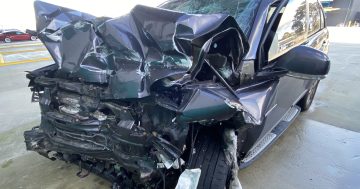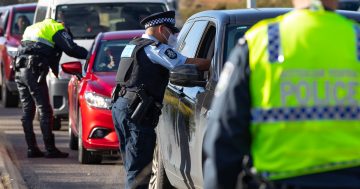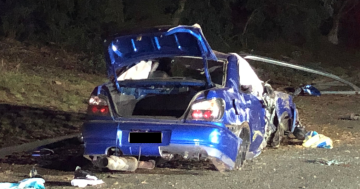
A 16-year-old unaccompanied learner driver was arrested last year after two girls were killed in a car crash along the Monaro Highway. Photo: Michelle Kroll.
A total of 1266 vehicles were reported stolen across the ACT last year, down from 1439 in 2021 but up slightly on the 1238 in 2020. It’s enough to give us the highest rate of vehicle theft in the country.
Over the past five financial years, a total of 19,448 drivers were caught speeding on Canberra’s roads.
And in 2022, 18 people were killed on ACT roads, making it the worst year since 2010.
Three members of the ACT Legislative Assembly have spent three months investigating how current laws could be changed to help address these problems, from sealing off a legal loophole to enforcing harsher penalties.
Their recommendations have now been presented to government.
Canberra Liberal’s Peter Cain, ACT Labor’s Marisa Paterson and Andrew Braddock from The Greens began their inquiry in December 2022 to deep dive into proposed changes to the ACT’s Road Safety legislation and one specific part of our Crimes legislation.
Both Amendment Bills were presented by ACT Minister for Roads and Active Travel Chris Steel in November 2022, in part driven by well-publicised advocacy from bereaved father, Tom McLuckie. His son Matthew was the innocent victim of a head-on collision on Hindmarsh Drive in May, blamed on illegal street racing.
Over three months, the Committee spoke with a number of road safety advocates, ACT Policing and Legal Aid ACT, as well as other individuals, groups and organisations.
Almost all of their seven recommendations deal with the Road Safety Amendment Bill, effectively ramps up punishments on existing laws.
The government proposes an immediate suspension of licence and the “discretionary power to seize the vehicle” in cases where drivers are caught doing more than 45 km/h over the speed limit or engaging in “furious, reckless and/or dangerous driving”.
For cases involving street racing, attempts at speed records, failure to stop for police and “improper use of a motor vehicle”, the maximum time a car could be seized would be increased from 10 days to 30. Repeat offenders could face a prison sentence, and thanks to an increase in “the range of offences that would result in an offender being classified as a repeat or aggravated offender”, this would be easier.

Tom McLuckie, whose son was accidentally caught up in an illegal street race on Hindmarsh Drive in May 2022. Photo: Albert McKnight.
Legal Aid ACT told the Committee that many of these punishments are already being meted out in court, while the ACT Council of Social Services feared it would “disproportionately impact vulnerable groups who are already overrepresented in the justice system, Aboriginal and Torres Strait Islander people in particular”.
However, both the Australian Federal Police Association and ACT Policing supported harsher penalties.
“Over the last five years, approximately half of the drivers charged with negligent or dangerous driving were driving whilst their licence was disqualified or under the influence of drugs and/or alcohol, and a third driving in an unregistered vehicle,” ACT Policing’s submission read.
“Increasing the offences will assist in keeping dangerous drivers off the road, creating a safer environment for all Canberrans.”
The changes also play directly into ACT Policing’s aim with ‘Operation TORIC’, which seeks to stem the increase in vehicle thefts, dangerous driving and other crimes. So far, it’s resulted in the arrest of 122 people who have been charged with 310 offences.
The Committee took the for and against arguments on board with a two-part recommendation.
“The changes proposed in the Road Safety Legislation Amendment Bill 2022 will be a step towards assisting police in their role in effectively responding to dangerous driving and improving public safety on the roads,” the report reads.
“The Committee recommends the ACT Government … conduct a review after two years after commencement to ensure vulnerable groups are not being adversely impacted by the reform.”
They came to a similar conclusion on the Crimes Amendment Bill, which gives the prosecution more of a leg to stand on when it comes to a case of “unauthorised entry of a motor vehicle without reasonable excuse”.
At the moment in the ACT, the prosecution must show the alleged thief was driving or riding in a stolen vehicle. According to a 2019 Supreme Court case, DNA evidence on the likes of the steering wheel or gear lever isn’t considered sufficient evidence.

ACT Policing Chief Police Officer Neil Gaughan with a police vehicle damaged in the line of duty. Photo: James Coleman.
“We have had people that have had DNA probably on seven or eight cars and the only one we have been able to charge them with is the one where we have actually had the eyes on them,” Chief Police Officer Neil Gaughan wrote in ACT Policing’s submission.
“At present in the ACT, vehicles are stolen, driven and then dumped by offenders who are aware that without evidence of them driving the vehicle, they are relatively safe from prosecution.”
In their final report, the Committee recommends it’s time this loophole was closed too, again on the condition that the government reviews the situation in two years.
This proviso is based on criticism from Legal Aid ACT, which feared the change might “risk criminalising well-intended conduct resulting in the defendant having to prove a reasonable excuse”.
The ACT Government has four months to respond to the inquiry.





















